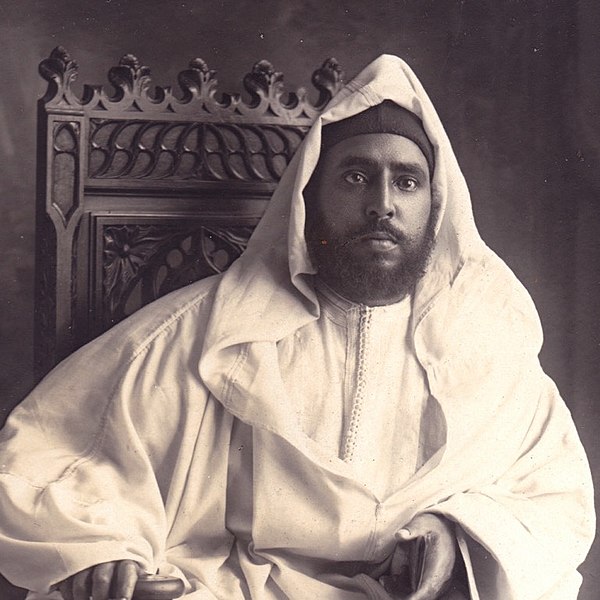The Hafidiya was a coup d'état in Morocco between 1907 and 1908 in which Abd al-Hafid seized power from his brother Abdelaziz. Abd al-Hafid started his movement in Marrakesh in the aftermath of the Algeciras Conference, the French occupation of Oujda and of Casablanca and the gaining the support of Amazigh leaders in the south. The Ulama of Fes supported Abdelhafid only with an unprecedented Conditioned Bay'ah, or pledge of allegiance.
Sultan Abd al-Aziz fleeing from the Battle of Marrakesh
Abd al-Aziz
Abd al-Hafid
Moulay Abd al-Aziz bin Hassan, born on 24 February 1881 in Marrakesh and died on 10 June 1943 in Tangier, was a sultan of Morocco from 9 June 1894 to 21 August 1908, as a ruler of the 'Alawi dynasty. He was proclaimed sultan at the age of sixteen after the death of his father Hassan I. Moulay Abdelaziz tried to strengthen the central government by implementing a new tax on agriculture and livestock, a measure which was strongly opposed by sections of the society. This in turn led Abdelaziz to mortgage the customs revenues and to borrow heavily from the French, which was met with widespread revolt and a revolution that deposed him in 1908 in favor of his brother Abd al-Hafid.
Abdelaziz of Morocco
Abd al-Aziz with his bicycle, published in La Vie illustrée [fr] 1901.
Sultan Abdelaziz in 1904.
Abdelaziz fleeing Marrakesh after the Battle of Marrakesh of the Hafidiya in 1908 as illustrated in Le Petit Journal.




![Abd al-Aziz with his bicycle, published in La Vie illustrée [fr] 1901.](https://upload.wikimedia.org/wikipedia/commons/thumb/1/1e/La_Vie_illustr%C3%A9e-_Abd-el-Aziz%2C_Sultan_du_Maroc%2C_et_sa_bicyclette.jpg/422px-La_Vie_illustr%C3%A9e-_Abd-el-Aziz%2C_Sultan_du_Maroc%2C_et_sa_bicyclette.jpg)
